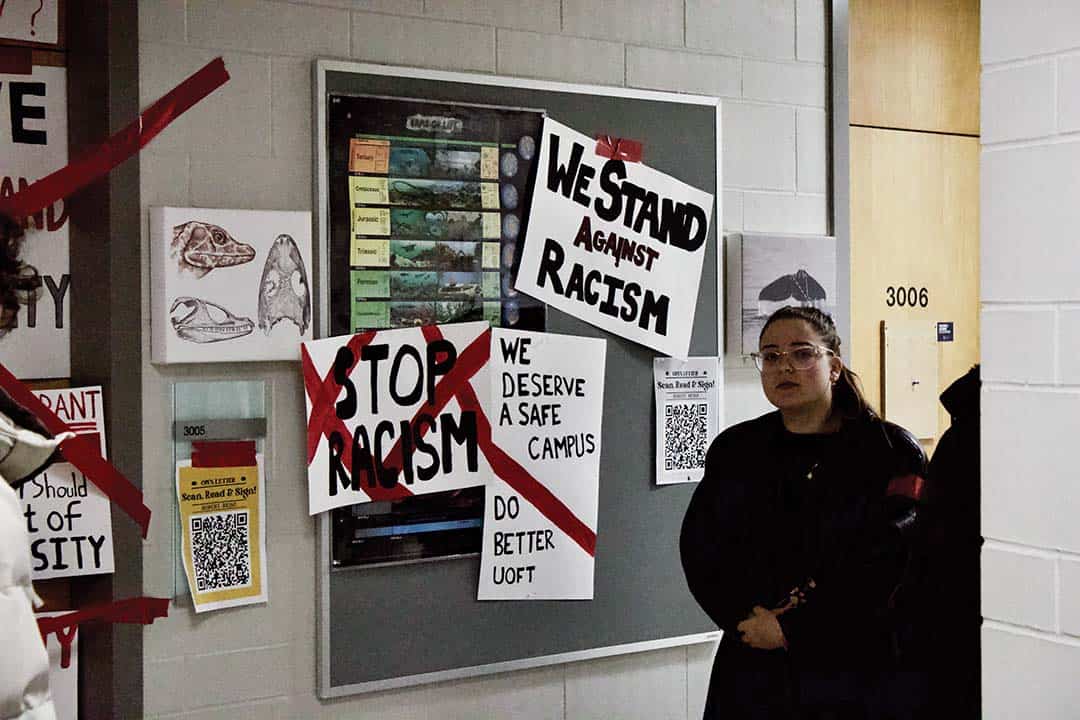Over a month after The Varsity brought forward the aftermath of an investigation conducted against UTM professor Robert Reisz, an expanding bubble of silence seems to be cocooning U of T’s campuses.
In 2020, U of T paleontology alumni Yara Haridy and Bryan Gee submitted a 72-page report to the university detailing the abuse of power they experienced at the hands of Reisz. In addition to several instances of sexual harassment that continued well into Haridy’s post-graduate career, the report alleged a litany of discriminatory incidents ranging from racial microaggressions to what Gee has called a “weird fixation on Chinese authenticity.”
A nearly two-year-long external investigation commissioned by U of T concluded that Reisz had indeed violated the social boundaries expected of faculty members. What has been a source of alarm, nonetheless, is how Reisz continues to enjoy supervisory privileges as a faculty member and is scheduled to teach courses at UTM for the winter 2023 semester.
It’s hard not to fall into the trap of seeing one professor — among over 15,000 faculty at U of T — as an individual outlier in the grand scheme of things. The university boasts courses upon courses on equity-related issues and seems to achieve a new milestone in progress almost every other month. To hear that someone has experienced harassment and bullying in what should be a safe space for all might be disconcerting to the average U of T student who has gotten used to navigating its diverse campus.
But Reisz and his comments do not exist in a vacuum. That a predator has faced no repercussions for his actions against Haridy and Gee — at least, none that have been made visible to the general public — is itself indicative of how he does not act alone. The fact that he is comfortable enough to partake in such anti-Asian microaggressions in the first place evinces how an entire institution works behind him to lay the foundations for casual discrimination to transpire. And without openly stating the actions being taken — in addition to an investigation that Haridy and Gee have revealed to be “incredibly draining, and at times, retraumatizing” — U of T’s silence on the matter speaks to a wider culture of racism and institutional neglect pervading academia.
Education as a site for (in)justice
Haridy and Gee took to Twitter and Medium last June to share their experiences, describing U of T’s reporting practices and processes as “intentionally opaque, a shield for the institution, not a shelter for the victims. There were (and still are) far more questions than answers.”
The reality is that post-secondary institutions have been designed since their inception to commit to change so long as the perpetrators within their walls remain insulated against the charge of violence. From an endless barrage of bureaucratic hoops to jump through to a consistent lack of transparency, the structures of accountability at universities operate with the interests of the institution in mind. It hence becomes necessary to deplatform voices that undermine institutional authority and invisibilize decision-making processes to facilitate the illusion of progressivity and inclusion.
But make no mistake: U of T’s silence on the matter is more than just mere complicity. Secrecy and inaction are tantamount to violence itself, particularly at a time when targeted attacks against Asian Canadians have risen 42 per cent as of December 2021.
Amid this tsunami of hate, Resiz’s comments toward Gee serve as a microcosm of a society that has been steadily moving toward a full-blown normalization of anti-Asian racism. The university’s decision to stand quietly behind an abuser, meanwhile, betrays its allegiance to the maintenance of such socio-political hierarchies.
More importantly, U of T’s apathy ingrains an anti-Asian agenda into the fabric of academia, communicating not only that there are seldom consequences to power abuse but also that its Asian students should be content with vague reassurances and shadowy investigations for the continued comfort of those in power.
Systemic — not just individual — change
Following The Varsity’s report, students and campus organizations have called for the immediate termination of Reisz’s employment. But change cannot stop at just getting rid of Reisz, who represents but a component of the broader institutional failures that have produced the climate for such a series of incidents to occur.
As it stands, Reisz enjoys the protection of academic tenure. That his misconduct has not established just cause for dismissal itself conveys the lack of accountability embedded in the terms and conditions surrounding tenure appointment and removal. It begets reevaluation of the degree to which experience and skill should triumph over character within academic circles. It forces us to consider who stands to benefit from existing tenure rules above all else. It incites anger seeing how racism and sexual harassment are given anything other than what should be a complete zero-tolerance approach.
The reality is that U of T will continue to see sporadic repeats of cases such as those of Haridy and Gee’s so long as the structural mechanisms of investigations and policymaking are in favour of perpetrators rather than victims.
At the most elementary level, the university cannot hope to enact widespread change without first normalizing anti-racism conversations and creating space for those who have experienced racial and sexual abuse to talk about their experiences. On a more advanced level, these processes cannot be anything less than 100 per cent transparent, publicly informing and actively engaging the larger U of T collective in a communal act of equity promotion and progress.
There might always be a Reisz. What matters just as much is whether there will be someone to fight for survivors and seek justice on their behalf. The question that remains is whether U of T will be ‘progressive’ enough to be the one to do it.
Noshin Talukdar is a fourth-year student at Victoria College. She is the equity columnist for The Varsity’s comment section.


